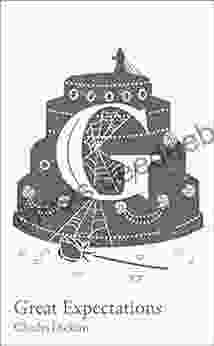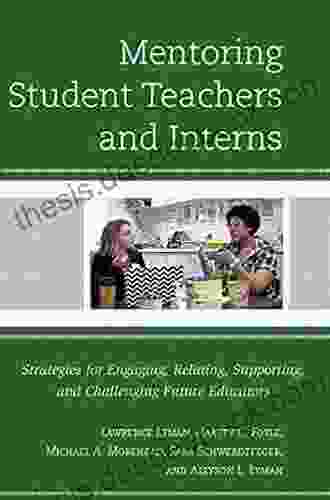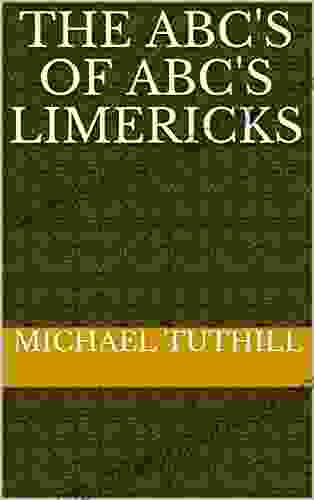Empowering Tomorrow's Educators: A Comprehensive Guide to Mentoring Student Teachers and Interns

5 out of 5
| Language | : | English |
| File size | : | 1611 KB |
| Text-to-Speech | : | Enabled |
| Screen Reader | : | Supported |
| Enhanced typesetting | : | Enabled |
| Word Wise | : | Enabled |
| Print length | : | 184 pages |
Mentoring student teachers and interns is a critical aspect of teacher education, as it provides aspiring educators with the opportunity to gain valuable hands-on experience and develop the skills and knowledge necessary to become effective teachers. Effective mentoring programs are essential for preparing student teachers and interns to meet the challenges of the classroom and to make a positive impact on student learning.
This guide will provide a comprehensive overview of best practices for mentoring student teachers and interns, offering guidance on effective strategies, communication techniques, and assessment methods to foster their professional growth.
Effective Mentoring Strategies
1. Establish Clear Expectations and Goals
At the beginning of the mentoring relationship, it is important to establish clear expectations and goals for both the mentor and the mentee. These expectations should be based on the mentee's individual needs and goals, as well as the requirements of the mentoring program. Clear expectations will help to ensure that both parties are working towards the same objectives and that the mentoring relationship is successful.
2. Provide Regular Feedback and Support
Regular feedback is essential for helping student teachers and interns to improve their teaching skills. Feedback should be specific, constructive, and timely. It should focus on both the strengths and weaknesses of the mentee's teaching, and it should provide suggestions for improvement. Mentors should also provide ongoing support to their mentees, both inside and outside of the classroom. This support can include providing emotional support, answering questions, and offering guidance on lesson planning and classroom management.
3. Encourage Reflection and Self-Assessment
Reflection is an important part of the learning process. Mentors should encourage their mentees to reflect on their teaching experiences and to identify areas for improvement. Self-assessment can help mentees to become more aware of their strengths and weaknesses, and it can help them to develop strategies for improvement. Mentors can facilitate reflection through journaling, self-assessment rubrics, and structured conversations.
4. Model Effective Teaching Practices
One of the best ways for mentors to help their mentees to become effective teachers is to model effective teaching practices. Mentors should demonstrate strong instructional skills, classroom management techniques, and communication skills. They should also be willing to share their knowledge and expertise with their mentees.
5. Provide Opportunities for Collaboration
Collaboration is an essential part of teaching. Mentors should provide opportunities for their mentees to collaborate with other teachers, both within the school and outside of the school. Collaboration can help mentees to learn from other teachers, share ideas, and develop a network of support.
Effective Communication Techniques
1. Establish Open and Honest Communication
Open and honest communication is essential for a successful mentoring relationship. Mentors and mentees should feel comfortable sharing their thoughts and feelings with each other. Mentors should create a safe and supportive environment where mentees feel comfortable asking questions, sharing concerns, and taking risks.
2. Use Active Listening
Active listening is a key communication skill for mentors. When mentees are sharing their thoughts and ideas, mentors should listen attentively and provide verbal and non-verbal cues to show that they are engaged. Mentors should also paraphrase and summarize what mentees have said to ensure that they understand their perspectives.
3. Use Positive Language
Positive language can help to build a strong mentor-mentee relationship. Mentors should use positive language when providing feedback and encouragement. They should focus on the mentee's strengths and provide constructive criticism in a respectful and supportive manner.
4. Use Humor Appropriately
Humor can be a great way to build rapport with mentees and to create a positive learning environment. However, it is important to use humor appropriately and to avoid making jokes that could be offensive or hurtful.
Effective Assessment Methods
1. Use a Variety of Assessment Methods
There are a variety of assessment methods that can be used to evaluate the progress of student teachers and interns. Mentors should use a variety of assessment methods to get a comprehensive view of the mentee's teaching skills.
2. Use Formative and Summative Assessments
Formative assessments are used to provide feedback and support to mentees as they are developing their teaching skills. Summative assessments are used to evaluate the mentee's overall progress at the end of the mentoring period.
3. Involve the Mentee in the Assessment Process
Mentees should be involved in the assessment process as much as possible. This can help them to develop self-assessment skills and to take ownership of their own professional development.
4. Use Assessment Data to Inform Instruction
Assessment data should be used to inform instruction and to provide targeted support to mentees. Mentors should use assessment data to identify areas where mentees need additional support and to develop strategies for improvement.
Mentoring student teachers and interns is a critical aspect of teacher education. By following the best practices outlined in this guide, mentors can help their mentees to develop the skills and knowledge necessary to become effective teachers. With strong mentoring relationships, student teachers and interns can gain the confidence and competence they need to make a positive impact on student learning.
5 out of 5
| Language | : | English |
| File size | : | 1611 KB |
| Text-to-Speech | : | Enabled |
| Screen Reader | : | Supported |
| Enhanced typesetting | : | Enabled |
| Word Wise | : | Enabled |
| Print length | : | 184 pages |
Do you want to contribute by writing guest posts on this blog?
Please contact us and send us a resume of previous articles that you have written.
 Book
Book Novel
Novel Story
Story Paperback
Paperback Magazine
Magazine Newspaper
Newspaper Paragraph
Paragraph Sentence
Sentence Bookmark
Bookmark Bibliography
Bibliography Foreword
Foreword Preface
Preface Synopsis
Synopsis Annotation
Annotation Scroll
Scroll Tome
Tome Bestseller
Bestseller Library card
Library card Biography
Biography Autobiography
Autobiography Memoir
Memoir Dictionary
Dictionary Thesaurus
Thesaurus Narrator
Narrator Character
Character Librarian
Librarian Card Catalog
Card Catalog Stacks
Stacks Study
Study Research
Research Scholarly
Scholarly Lending
Lending Academic
Academic Special Collections
Special Collections Interlibrary
Interlibrary Thesis
Thesis Dissertation
Dissertation Awards
Awards Reading List
Reading List Book Club
Book Club Rich Thomas
Rich Thomas John David Krygelski
John David Krygelski Mark Wayne Mcginnis
Mark Wayne Mcginnis Messoud Efendiev
Messoud Efendiev Robert Munro
Robert Munro Diana Aleksandrova
Diana Aleksandrova John Glad
John Glad A Bean
A Bean Claire Kingsley
Claire Kingsley Latoya Chandler
Latoya Chandler Matt Dunn
Matt Dunn Nick Martell
Nick Martell Ifaanu Ifaanu
Ifaanu Ifaanu Michelle Knight
Michelle Knight Steven Wolff
Steven Wolff J F Holmes
J F Holmes Malcolm Spector
Malcolm Spector Michael Newton
Michael Newton Casi Mclean
Casi Mclean John L Jackson Jr
John L Jackson Jr
Light bulbAdvertise smarter! Our strategic ad space ensures maximum exposure. Reserve your spot today!

 Thomas HardyShimane Prefecture: A Photographic Journey Through Enchanting Landscapes and...
Thomas HardyShimane Prefecture: A Photographic Journey Through Enchanting Landscapes and... Joel MitchellFollow ·4.6k
Joel MitchellFollow ·4.6k Tom ClancyFollow ·10.9k
Tom ClancyFollow ·10.9k Julian PowellFollow ·19.3k
Julian PowellFollow ·19.3k Dean CoxFollow ·14k
Dean CoxFollow ·14k Gilbert CoxFollow ·13.6k
Gilbert CoxFollow ·13.6k Will WardFollow ·3.5k
Will WardFollow ·3.5k Ethan GrayFollow ·5.2k
Ethan GrayFollow ·5.2k Henry Wadsworth LongfellowFollow ·6.5k
Henry Wadsworth LongfellowFollow ·6.5k

 Russell Mitchell
Russell MitchellGCSE Set Text Student Edition: Collins Classroom Classics...
The GCSE Set Text Student Edition: Collins...

 Ralph Turner
Ralph TurnerSix Sigma Lean Green Belt Training for Beginners with...
What is Six...

 Travis Foster
Travis Foster10 Life-Changing Lessons I Learned When I Was Single
Being single can...

 Jermaine Powell
Jermaine PowellOne Great Insight Is Worth a Thousand Good Ideas
In the competitive and...
5 out of 5
| Language | : | English |
| File size | : | 1611 KB |
| Text-to-Speech | : | Enabled |
| Screen Reader | : | Supported |
| Enhanced typesetting | : | Enabled |
| Word Wise | : | Enabled |
| Print length | : | 184 pages |














